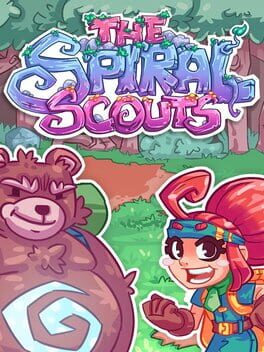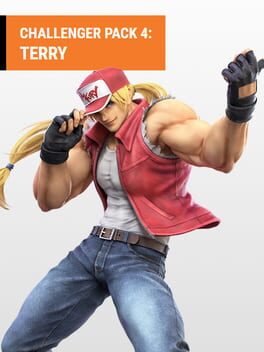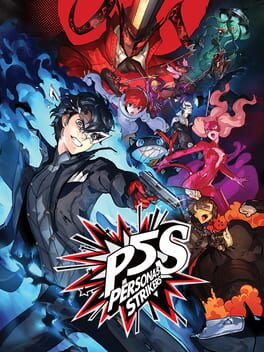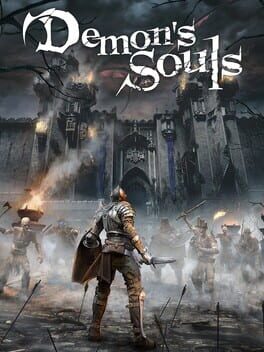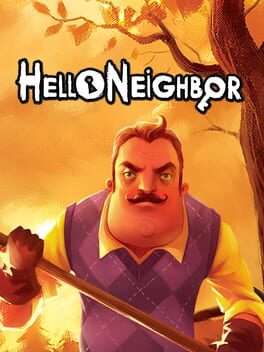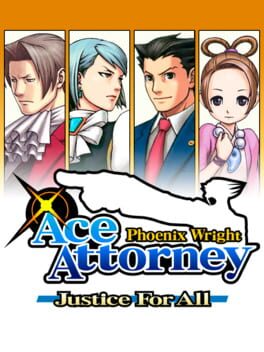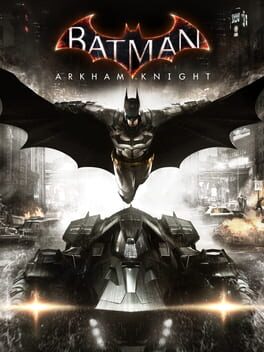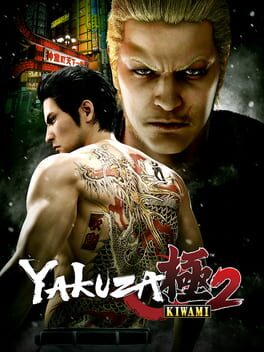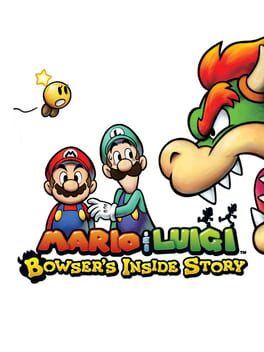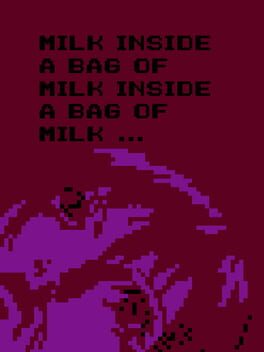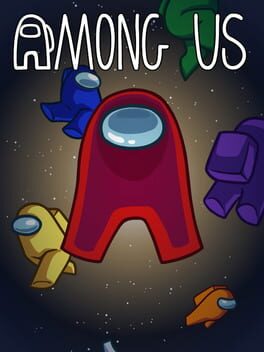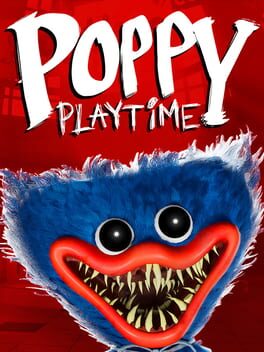TheBigBurger
2018
2020
I don't think it's bad per se, but after playing through the first dungeon, I can say that I'm not really into it. Fun interactions with the Phantom Thieves, neat and flashy gameplay that's in line with P5's style, and some cool new characters (mainly the funny guy whose name I forgot). But I just couldn't really be bothered with it. It felt a bit like an updated retread of base 5 and while the gameplay was pretty cool, it's definitely not my cup of tea (I think that kinda goes for Musous in general).
Don't have much against this game, it just doesn't seem for me.
Don't have much against this game, it just doesn't seem for me.
2020
Had a good amount of fun with this one, but something about it always keeps me from making progress. Which is weird because it has solid combat, great level design, and absolutely dropdead gorgeous visuals. But the more I look into it, the decisions it makes as a remake (ESPECIALLY visually) kinda hold it back for me. It makes me just wanna play the original more and experience that unfiltered vision that feels kinda tampered with here.
One day I'll come back to it, but for now, I might just skip it and go on to Dark Souls.
One day I'll come back to it, but for now, I might just skip it and go on to Dark Souls.
2017
2007
SPOILERS FOR CASE 3 OF ACE ATTORNEY 2
Coming right off of my Ace Attorney 1 replay and just loving that game to death, I admittedly had some preconceived thoughts about Justice for All. I was under the impression that it was merely a subpar follow-up to the original game whose only notable addition to the series was the revered Farewell, My Turnabout case. Having heard these thoughts repeated ad infinitum, I was genuinely not looking forward to getting into this game. I even dropped it just under a year ago after getting less than halfway through the second case because my ass was just not feeling it. I will say, dropping the game was probably the best choice I could've made for maximizing my enjoyment of it, because I was in a much more receptive, accepting mindset towards it this time around. I stopped being a sheep and just played the game hoping I'd at least be entertained. And coming out of it, I can say that I was more than just entertained.
With all that setup in mind, how does the game actually stack up? Well, in many places, this game has both the best and worst shit I've seen in the series up until this point. A game of highs and lows, if you will. And frankly, no case in the entire game exemplifies this idea to such an extreme extent and my experience with JFA as a whole, better than the notorious Turnabout Big Top case, which is why I want to focus in on it specifically, as opposed to going in chronological order of each case.
I had heard so much bad stuff about this case before starting it that I was honestly a little nervous that this would be another point where I might consider dropping the game for almost a year again. I had thoroughly enjoyed the previous case and was hoping I wouldn’t share the complaints I had heard other people have for this next one. And for the first half of the case? Most of the complaints I had heard rang absolutely true and THEN SOME. Turnabout Big Top starts off with an unbearably long low point that lasts all the way throughout the first trial day. Now, Ace Attorney is known for having wacky, zany, over-the-top characters, and I’ve always considered that to be one of its strengths that makes it infinitely charming to me. However, this case officially takes it all much too far. The client for this case, Maximillion Galactica has a neat design, but good God, after more than a few minutes of interacting with him, I just wanted him to shut up. He attempts to feel “flashy”, but all of that flash just burned my eyes out in frustration at how flat of a character he actually was. You could replace him with a stock image of a lamppost and I genuinely think the case would greatly benefit from it. And don’t even get me started with how he (and one other character) is lusting after an actual SIXTEEN-YEAR OLD. Like holy shit, how was I expected to want this guy to be anywhere other than prison? Need an alternate ending where Phoenix, after finding this out, purposefully helps put him in jail where he belongs tbh!!!!!!
Anyways, Max is ass but the next character I want to focus on is Ben the Ventriloquist. He is an equally worthless character who tries too hard to have some charming gimmick with his puppet and ends up being yet another uncomfortable personality in how he’s a grown-ass, 31 year old MAN trying to marry a fucking 16 year old girl. And honestly, I generally try to look past shit like this in stories if there’s at least decent writing behind it, but the whole love triangle between him, Max, and Regina feels so out of left field, unnecessary, and crammed in your face that it’s impossible for me not to ignore. His whole puppet schtick was extremely unbearable as well. I never found him funny or entertaining in the slightest. These two characters are possibly my least favorite in the series by a wide margin. They’re an attempt at charming, wacky characters, but they both fall flat on their faces by being so genuinely unlikable and irritating.
Those two are at the core of most of my issues with this case because the entirety of the plot surrounding them was inherently brought down by their mere association. The actual mystery at this point in the story wasn’t doing me any favors either as most of the first day dragged its feet, feeling less like a mystery and more like a washed up, unfunny circus routine (which I suppose is fitting).
My enjoyment of the series had never been lower, and I even considered skimming through dialogue just to get past this tedious, unbearable case.
But then something really strange happened.
Turnabout Big Top
Got good.
The difference in quality between the first and second days cannot be understated. For the most part, the terrible characters I mentioned before have very, very little screentime. And the characters that actually DO get focus are not only compelling, but genuinely emotionally gripping, incredibly charming, and actually likable. Moe the Clown, a character that initially caused me the same level of irritation as Max and Ben due to his eye-burning design and unfunny gimmick, became a surprisingly touching character when all he wanted was to help Regina come to terms with her father’s death, rather than allow her to stay in blissful ignorance. It was a turn for his character that I didn’t expect at all, but it helped elevate my emotional engagement with the case and him as a character, so I’m all for it. And speaking of Regina, she was pretty much the only character introduced in the first day of the case that I actually liked. She was a bit of a brat, yeah, but I could tell that she meant well and she was absolutely adorable. It was abundantly clear that she lived a spoiled, sheltered life, but I couldn’t help but feel for the poor girl in spite of that. Her father had just been killed, but she hardly seemed to really comprehend the gravity of that fact. While she was undoubtedly a very “cute” character, it’s the juxtaposition of that and this undercurrent of somberness that was prevalent in most of her scenes that really helped me connect with her. And finally, we have Acro the Acrobat.
What a phenomenal killer.
Like no other killer before or after him, Acro stands tall as possibly THE MOST tragic and sympathetic character in the series up until this point. In contrast to the previously over-the-top characters, Acro instantly stands out from the moment we first meet him. He’s not some loudmouthed, unfunny CLOD like most of the others, he’s gentle and soft-spoken, with birds sitting with him on his wheelchair highlighting the tranquil, calming energy that his personality gives off. Despite this, there’s this general feeling of sadness that pervades all of his scenes, much like Regina. This gives the two of them a sort of connective tissue, as their role in the story would become more pronounced as it reached its climax.
Acro brings a lot of emotional depth to this case that I haven’t really felt with other killers in this series, even the best ones. He’s possibly the most unique killer the series has seen yet, thanks to his heartbreaking circumstances and understandable motives. He’s just a broken man who lost everything because of one girl’s naïveté, but he understandably cannot bring himself to forgive her for it, despite knowing deep down that what he wants to do is wrong, without doubt. It is a very mature idea for this series to tackle and I think it’s an incredibly “human” concept.
Even if it’s not on the scale of outright murder, there do come times where someone wrongs us in ways that we simply cannot reconcile with, even if it was unintentional on their part. Sometimes we’re hurt so profoundly by someone that it can make us someone we’re not, we lose the ability to understand, to empathize. Blinded by hatred, Acro ended up accidentally killing the man that meant the most to him. The man that gave him and his, now comatose, brother a chance when everyone had abandoned him before. He not only hurt himself in doing this, but wrongfully took the father of an innocent young girl who could barely even comprehend what had happened.
And when it’s finally time to corner him in the trial, and Phoenix exposes his crimes, there’s no twist “unmasking” where he reveals that he was actually crazy the whole time and laughs maniacally while cursing Phoenix for foiling his plan.
All we get are tears.
A sea of tears from a broken man who couldn’t let go of his hatred and heartbreak. Tears from a broken man who couldn’t find it in himself to understand the person who hurt him so much. And in his sadness and newfound self-hatred, he’s taken away, forced to think about what he did for the foreseeable future, with the audience never knowing for sure if he’ll find peace.
What a special, special character.
THAT is how you write a compelling, layered, and emotionally-investing antagonist. He has a sympathetic, sufficiently-explored backstory that informs his motive, and we may not agree with what he does, but we can certainly understand his actions as a result. These certainly aren’t the only way to effectively write an antagonist, but I cannot sing Acro’s praises enough, he almost single-handedly flipped my view on this case.
After the dust settles, Regina, after watching all of this unfold, is unable to continue with the blissful ignorance that had defined her character at the beginning of this case. She weeps, she shouts, she blames herself for what happened, and still has trouble wrapping her head around it, but she can finally begin to accept what happened to her father. And with that, the process of healing can begin, and she can grow as a person as she plans to right her wrong, and this most intriguing case can finally end on a hopeful note.
When all is said and done, Turnabout Big Top ended up being the biggest surprise in the game by far. A difficult case to truly explain my thoughts on. One I vehemently hate and undeniably love in equal regards. It truly had some abysmal lows that I absolutely cannot forgive. The characters in the first half, the mystery being nonsensical for the most part throughout (even in the second half), and don’t even get me started on the annoying ass cross-exam where you lose health JUST FOR PRESSING MOE. I can 100% understand why someone would look at this shit and say this is the worst case in the whole trilogy.
But at the same time. I respect and appreciate so much of what that second half manages to accomplish that I can’t, in good faith, agree with the majority of people here.
And that’s kind of how I feel about this game as a whole (just to a much less extreme extent). There were times during some of the cases early on that felt a bit padded or aimless. The music of the game is a noticeable downgrade from Ace Attorney 1’s soundtrack, I feel. But similarly to how I feel about TBT, I really do believe that the highs of this game are more than enough to make up for its unfortunate missteps.
Franziska might not have the complexity that Edgeworth did in the first game, but she’s still a damn entertaining prosecutor with a great design that I thoroughly enjoyed arguing against. Speaking of Edgeworth, his return in this game was everything I could’ve hoped it would be. Picking up right from where he left off in the first game, it truly felt like he’s grown and matured as a person, cultivating an ideology that shakes Phoenix to his core. And how could I forget that last case that everyone RIGHTFULLY hypes up so much? It is quite confidently one of the finest stories this series has produced yet. Boasting a deliciously devilish villain that caused my jaw to hit the floor on multiple occasions, the most urgency, tension and suspense in an AA case so far with how it was a constant race against time, and an unbelievably satisfying finale that had me out of my seat and on the brink of tears at every step (while also giving Franziska some much-appreciated development).
So all in all, I left Justice for All incredibly satisfied and impressed, thankful to have stuck with it through to the end. Because I don’t care what anybody says, this is a good ass game and a worthy sequel to the first.
Coming right off of my Ace Attorney 1 replay and just loving that game to death, I admittedly had some preconceived thoughts about Justice for All. I was under the impression that it was merely a subpar follow-up to the original game whose only notable addition to the series was the revered Farewell, My Turnabout case. Having heard these thoughts repeated ad infinitum, I was genuinely not looking forward to getting into this game. I even dropped it just under a year ago after getting less than halfway through the second case because my ass was just not feeling it. I will say, dropping the game was probably the best choice I could've made for maximizing my enjoyment of it, because I was in a much more receptive, accepting mindset towards it this time around. I stopped being a sheep and just played the game hoping I'd at least be entertained. And coming out of it, I can say that I was more than just entertained.
With all that setup in mind, how does the game actually stack up? Well, in many places, this game has both the best and worst shit I've seen in the series up until this point. A game of highs and lows, if you will. And frankly, no case in the entire game exemplifies this idea to such an extreme extent and my experience with JFA as a whole, better than the notorious Turnabout Big Top case, which is why I want to focus in on it specifically, as opposed to going in chronological order of each case.
I had heard so much bad stuff about this case before starting it that I was honestly a little nervous that this would be another point where I might consider dropping the game for almost a year again. I had thoroughly enjoyed the previous case and was hoping I wouldn’t share the complaints I had heard other people have for this next one. And for the first half of the case? Most of the complaints I had heard rang absolutely true and THEN SOME. Turnabout Big Top starts off with an unbearably long low point that lasts all the way throughout the first trial day. Now, Ace Attorney is known for having wacky, zany, over-the-top characters, and I’ve always considered that to be one of its strengths that makes it infinitely charming to me. However, this case officially takes it all much too far. The client for this case, Maximillion Galactica has a neat design, but good God, after more than a few minutes of interacting with him, I just wanted him to shut up. He attempts to feel “flashy”, but all of that flash just burned my eyes out in frustration at how flat of a character he actually was. You could replace him with a stock image of a lamppost and I genuinely think the case would greatly benefit from it. And don’t even get me started with how he (and one other character) is lusting after an actual SIXTEEN-YEAR OLD. Like holy shit, how was I expected to want this guy to be anywhere other than prison? Need an alternate ending where Phoenix, after finding this out, purposefully helps put him in jail where he belongs tbh!!!!!!
Anyways, Max is ass but the next character I want to focus on is Ben the Ventriloquist. He is an equally worthless character who tries too hard to have some charming gimmick with his puppet and ends up being yet another uncomfortable personality in how he’s a grown-ass, 31 year old MAN trying to marry a fucking 16 year old girl. And honestly, I generally try to look past shit like this in stories if there’s at least decent writing behind it, but the whole love triangle between him, Max, and Regina feels so out of left field, unnecessary, and crammed in your face that it’s impossible for me not to ignore. His whole puppet schtick was extremely unbearable as well. I never found him funny or entertaining in the slightest. These two characters are possibly my least favorite in the series by a wide margin. They’re an attempt at charming, wacky characters, but they both fall flat on their faces by being so genuinely unlikable and irritating.
Those two are at the core of most of my issues with this case because the entirety of the plot surrounding them was inherently brought down by their mere association. The actual mystery at this point in the story wasn’t doing me any favors either as most of the first day dragged its feet, feeling less like a mystery and more like a washed up, unfunny circus routine (which I suppose is fitting).
My enjoyment of the series had never been lower, and I even considered skimming through dialogue just to get past this tedious, unbearable case.
But then something really strange happened.
Turnabout Big Top
Got good.
The difference in quality between the first and second days cannot be understated. For the most part, the terrible characters I mentioned before have very, very little screentime. And the characters that actually DO get focus are not only compelling, but genuinely emotionally gripping, incredibly charming, and actually likable. Moe the Clown, a character that initially caused me the same level of irritation as Max and Ben due to his eye-burning design and unfunny gimmick, became a surprisingly touching character when all he wanted was to help Regina come to terms with her father’s death, rather than allow her to stay in blissful ignorance. It was a turn for his character that I didn’t expect at all, but it helped elevate my emotional engagement with the case and him as a character, so I’m all for it. And speaking of Regina, she was pretty much the only character introduced in the first day of the case that I actually liked. She was a bit of a brat, yeah, but I could tell that she meant well and she was absolutely adorable. It was abundantly clear that she lived a spoiled, sheltered life, but I couldn’t help but feel for the poor girl in spite of that. Her father had just been killed, but she hardly seemed to really comprehend the gravity of that fact. While she was undoubtedly a very “cute” character, it’s the juxtaposition of that and this undercurrent of somberness that was prevalent in most of her scenes that really helped me connect with her. And finally, we have Acro the Acrobat.
What a phenomenal killer.
Like no other killer before or after him, Acro stands tall as possibly THE MOST tragic and sympathetic character in the series up until this point. In contrast to the previously over-the-top characters, Acro instantly stands out from the moment we first meet him. He’s not some loudmouthed, unfunny CLOD like most of the others, he’s gentle and soft-spoken, with birds sitting with him on his wheelchair highlighting the tranquil, calming energy that his personality gives off. Despite this, there’s this general feeling of sadness that pervades all of his scenes, much like Regina. This gives the two of them a sort of connective tissue, as their role in the story would become more pronounced as it reached its climax.
Acro brings a lot of emotional depth to this case that I haven’t really felt with other killers in this series, even the best ones. He’s possibly the most unique killer the series has seen yet, thanks to his heartbreaking circumstances and understandable motives. He’s just a broken man who lost everything because of one girl’s naïveté, but he understandably cannot bring himself to forgive her for it, despite knowing deep down that what he wants to do is wrong, without doubt. It is a very mature idea for this series to tackle and I think it’s an incredibly “human” concept.
Even if it’s not on the scale of outright murder, there do come times where someone wrongs us in ways that we simply cannot reconcile with, even if it was unintentional on their part. Sometimes we’re hurt so profoundly by someone that it can make us someone we’re not, we lose the ability to understand, to empathize. Blinded by hatred, Acro ended up accidentally killing the man that meant the most to him. The man that gave him and his, now comatose, brother a chance when everyone had abandoned him before. He not only hurt himself in doing this, but wrongfully took the father of an innocent young girl who could barely even comprehend what had happened.
And when it’s finally time to corner him in the trial, and Phoenix exposes his crimes, there’s no twist “unmasking” where he reveals that he was actually crazy the whole time and laughs maniacally while cursing Phoenix for foiling his plan.
All we get are tears.
A sea of tears from a broken man who couldn’t let go of his hatred and heartbreak. Tears from a broken man who couldn’t find it in himself to understand the person who hurt him so much. And in his sadness and newfound self-hatred, he’s taken away, forced to think about what he did for the foreseeable future, with the audience never knowing for sure if he’ll find peace.
What a special, special character.
THAT is how you write a compelling, layered, and emotionally-investing antagonist. He has a sympathetic, sufficiently-explored backstory that informs his motive, and we may not agree with what he does, but we can certainly understand his actions as a result. These certainly aren’t the only way to effectively write an antagonist, but I cannot sing Acro’s praises enough, he almost single-handedly flipped my view on this case.
After the dust settles, Regina, after watching all of this unfold, is unable to continue with the blissful ignorance that had defined her character at the beginning of this case. She weeps, she shouts, she blames herself for what happened, and still has trouble wrapping her head around it, but she can finally begin to accept what happened to her father. And with that, the process of healing can begin, and she can grow as a person as she plans to right her wrong, and this most intriguing case can finally end on a hopeful note.
When all is said and done, Turnabout Big Top ended up being the biggest surprise in the game by far. A difficult case to truly explain my thoughts on. One I vehemently hate and undeniably love in equal regards. It truly had some abysmal lows that I absolutely cannot forgive. The characters in the first half, the mystery being nonsensical for the most part throughout (even in the second half), and don’t even get me started on the annoying ass cross-exam where you lose health JUST FOR PRESSING MOE. I can 100% understand why someone would look at this shit and say this is the worst case in the whole trilogy.
But at the same time. I respect and appreciate so much of what that second half manages to accomplish that I can’t, in good faith, agree with the majority of people here.
And that’s kind of how I feel about this game as a whole (just to a much less extreme extent). There were times during some of the cases early on that felt a bit padded or aimless. The music of the game is a noticeable downgrade from Ace Attorney 1’s soundtrack, I feel. But similarly to how I feel about TBT, I really do believe that the highs of this game are more than enough to make up for its unfortunate missteps.
Franziska might not have the complexity that Edgeworth did in the first game, but she’s still a damn entertaining prosecutor with a great design that I thoroughly enjoyed arguing against. Speaking of Edgeworth, his return in this game was everything I could’ve hoped it would be. Picking up right from where he left off in the first game, it truly felt like he’s grown and matured as a person, cultivating an ideology that shakes Phoenix to his core. And how could I forget that last case that everyone RIGHTFULLY hypes up so much? It is quite confidently one of the finest stories this series has produced yet. Boasting a deliciously devilish villain that caused my jaw to hit the floor on multiple occasions, the most urgency, tension and suspense in an AA case so far with how it was a constant race against time, and an unbelievably satisfying finale that had me out of my seat and on the brink of tears at every step (while also giving Franziska some much-appreciated development).
So all in all, I left Justice for All incredibly satisfied and impressed, thankful to have stuck with it through to the end. Because I don’t care what anybody says, this is a good ass game and a worthy sequel to the first.
2007
(I do plan on making a longer review for this game at some point after playing through Persona 3 Portable.)
Persona 3 is honestly kind of a miracle of a game for me. It's one that I could've easily skipped over, as I wrote it off due to how it looked aged to hell to me and not being particularly impressed with P4 despite how highly regarded that game is, and worrying P3 would be the same.
But in April of last year, just over one month after the Promised Day, and after close friends constantly pushed the agenda, I finally began streaming it.
And I am unbelievably thankful that I did, because it ended up being one of my most cherished gaming experiences I'd ever have. And so, seeing as today is The Promised Day, I'd like to take some time to show my appreciation for this story’s characters and explain just a little bit of why I think this game boasts one of the finest casts in gaming.
Persona 3 is a game that often gets flak for being overly slow or dragging in the earlier parts of the game. And while I certainly agree that the first half is noticeably slower than the godly second, I don't agree with the notion that the game drags in its writing.
I love how focused the game is in establishing its characters, relationships, dynamics, and especially their flaws and how said they impact how they interact with each other, in these earlier months of the game. Whether it be Yukari's loneliness combined with her fear of letting people get too close to her, Junpei's selfish reasons for joining SEES being that he seeks validation and recognition for others, along with how second-rate he feels compared to the protagonist, or Mitsuru's social awkwardness leading her to come off as overly cold and unapproachable in the eyes of her teammates. Every character present in this cast is rich with nuance, struggle, and dynamism, consistently growing as people as the story progresses.
For these reasons, the characters were able to feel real to me. They stopped being dumb anime game caricatures and managed to feel like actual, genuine people that could think and react like a person would. For this reason, I was more invested in this game’s cast than either 4 or 5’s. And watching them all grow as people and friends was incredibly gripping.
As someone who loves it when games feel down to Earth and “human”, I was more than satisfied with how Persona 3 explored its characters, how we deal with loss, and how our lives are finite and we should appreciate what time we have while we have it. I’m so thankful I was finally able to experience a March 5th as an OFFICIAL Persona fan, and while I jokingly slander it, I am eternally grateful that I could share it with so many of my genuinely beloved friends through streaming it.
I love Persona 3.
Persona 3 is honestly kind of a miracle of a game for me. It's one that I could've easily skipped over, as I wrote it off due to how it looked aged to hell to me and not being particularly impressed with P4 despite how highly regarded that game is, and worrying P3 would be the same.
But in April of last year, just over one month after the Promised Day, and after close friends constantly pushed the agenda, I finally began streaming it.
And I am unbelievably thankful that I did, because it ended up being one of my most cherished gaming experiences I'd ever have. And so, seeing as today is The Promised Day, I'd like to take some time to show my appreciation for this story’s characters and explain just a little bit of why I think this game boasts one of the finest casts in gaming.
Persona 3 is a game that often gets flak for being overly slow or dragging in the earlier parts of the game. And while I certainly agree that the first half is noticeably slower than the godly second, I don't agree with the notion that the game drags in its writing.
I love how focused the game is in establishing its characters, relationships, dynamics, and especially their flaws and how said they impact how they interact with each other, in these earlier months of the game. Whether it be Yukari's loneliness combined with her fear of letting people get too close to her, Junpei's selfish reasons for joining SEES being that he seeks validation and recognition for others, along with how second-rate he feels compared to the protagonist, or Mitsuru's social awkwardness leading her to come off as overly cold and unapproachable in the eyes of her teammates. Every character present in this cast is rich with nuance, struggle, and dynamism, consistently growing as people as the story progresses.
For these reasons, the characters were able to feel real to me. They stopped being dumb anime game caricatures and managed to feel like actual, genuine people that could think and react like a person would. For this reason, I was more invested in this game’s cast than either 4 or 5’s. And watching them all grow as people and friends was incredibly gripping.
As someone who loves it when games feel down to Earth and “human”, I was more than satisfied with how Persona 3 explored its characters, how we deal with loss, and how our lives are finite and we should appreciate what time we have while we have it. I’m so thankful I was finally able to experience a March 5th as an OFFICIAL Persona fan, and while I jokingly slander it, I am eternally grateful that I could share it with so many of my genuinely beloved friends through streaming it.
I love Persona 3.
2017
Probably the most contentious game I've played so far in this series, and I can absolutely understand why. A lot of what it does undermines the original game so massively in both aesthetic and tone that I can't overlook it (seriously, the music choice during the beginning of chapter 12 and near the end of chapter 16 are honestly laughable). Kiwami 1 was a flawed remake for sure, but I can easily see why this is by far the most "you either love it or hate it" game I've seen in the series yet.
The Dragon Engine looks immaculate visually and the combat has a nice, free flow to it that I really dig, but it still feels like RGG's still in the early development phase with it. It's incredibly janky, not as mechanically rich as either 0 or Kiwami 1, and it can feel a bit too easy at times. I'm sure later Dragon Engine games (the Judgment series, essentially) will do this better, but it still feels like we've got a bit to go before it's truly ready.
That all being said, I still thoroughly loved my time with this game from start to finish. Call it brainrot, call it dickriding, call it stockholm syndrome, call it whatever the fuck you want, I can't help but love Yakuza, it's my new addiction, really.
The story of Yakuza 2 is preserved here in all (or most of) its glory. Kiryu is just as strong of a character as he's always been, and I love seeing his ideology being tested at every turn. It's great to see some pushback to his sense of honor, and watching him overcome all of that in the end and come out a stronger person will never not be heart-wrenchingly satisfying. Ryuji is the biggest contributor to this, as he's an amazing foil to Kiryu (probably the best in the series), boasting his own unique sense of honor that clashes perfectly with Kiryu's, as he's more vain and greedy, having yet to understand Kiryu's more pure and true sense of honor.
Also speaking of Ryuji, can I just say that he's honestly one of the most entertaining characters in this franchise. From his phenomenal voice performance, to his arrogant, RAW personality, every scene he showed up in had my full attention throughout. And I loved when the game blew past his arrogance and badassery and allowed me to genuinely sympathize with and understand him on a closer, more personal level, which only added to the INCREDIBLE finale this game contains (seriously, that final boss was insane).
I'm not sure if I prefer him or Yakuza 1's villain more yet, but I'm absolutely delighted that the series has failed to disappoint with its major villains so far, and I hope that continues.
Also really loved Sayama's character. Following her as she learned about her past and developed a genuinely touching, heartfelt bond with Kiryu served to be the surprising emotional core of this story, and I loved it. Her personality's got that signature Yakuza rawness with a feminine touch, but she was nuanced in her writing to where it felt like more than just flash without any substance (and fighting with her was always cool as hell), and her arc is just great.
And yeah, despite my grievances with the combat, what I said about the Dragon Engine's visuals is still totally true. The cutscenes and dynamic intros have never looked better, to be honest (final boss's dynamic intro and final QTE were especially phenomenal) and they always succeeded at getting me hype, or immersing me in the moment.
So overall, while I do absolutely understand why someone would find this remake to be vastly inferior to the original (I would probably end up agreeing with that notion myself if I ever do get to playing it), and disliking or even hating it as a result, I'm so glad that I finally played this game. It provided me with enormous joy as I experienced this story and saw these characters unravel once more. I look forward to what the rest of the series has to offer, but I can safely say that the Kiwami games, while not perfect by any means, helped continue my unwavering love for this series and I could not be more thankful for that.
The Dragon Engine looks immaculate visually and the combat has a nice, free flow to it that I really dig, but it still feels like RGG's still in the early development phase with it. It's incredibly janky, not as mechanically rich as either 0 or Kiwami 1, and it can feel a bit too easy at times. I'm sure later Dragon Engine games (the Judgment series, essentially) will do this better, but it still feels like we've got a bit to go before it's truly ready.
That all being said, I still thoroughly loved my time with this game from start to finish. Call it brainrot, call it dickriding, call it stockholm syndrome, call it whatever the fuck you want, I can't help but love Yakuza, it's my new addiction, really.
The story of Yakuza 2 is preserved here in all (or most of) its glory. Kiryu is just as strong of a character as he's always been, and I love seeing his ideology being tested at every turn. It's great to see some pushback to his sense of honor, and watching him overcome all of that in the end and come out a stronger person will never not be heart-wrenchingly satisfying. Ryuji is the biggest contributor to this, as he's an amazing foil to Kiryu (probably the best in the series), boasting his own unique sense of honor that clashes perfectly with Kiryu's, as he's more vain and greedy, having yet to understand Kiryu's more pure and true sense of honor.
Also speaking of Ryuji, can I just say that he's honestly one of the most entertaining characters in this franchise. From his phenomenal voice performance, to his arrogant, RAW personality, every scene he showed up in had my full attention throughout. And I loved when the game blew past his arrogance and badassery and allowed me to genuinely sympathize with and understand him on a closer, more personal level, which only added to the INCREDIBLE finale this game contains (seriously, that final boss was insane).
I'm not sure if I prefer him or Yakuza 1's villain more yet, but I'm absolutely delighted that the series has failed to disappoint with its major villains so far, and I hope that continues.
Also really loved Sayama's character. Following her as she learned about her past and developed a genuinely touching, heartfelt bond with Kiryu served to be the surprising emotional core of this story, and I loved it. Her personality's got that signature Yakuza rawness with a feminine touch, but she was nuanced in her writing to where it felt like more than just flash without any substance (and fighting with her was always cool as hell), and her arc is just great.
And yeah, despite my grievances with the combat, what I said about the Dragon Engine's visuals is still totally true. The cutscenes and dynamic intros have never looked better, to be honest (final boss's dynamic intro and final QTE were especially phenomenal) and they always succeeded at getting me hype, or immersing me in the moment.
So overall, while I do absolutely understand why someone would find this remake to be vastly inferior to the original (I would probably end up agreeing with that notion myself if I ever do get to playing it), and disliking or even hating it as a result, I'm so glad that I finally played this game. It provided me with enormous joy as I experienced this story and saw these characters unravel once more. I look forward to what the rest of the series has to offer, but I can safely say that the Kiwami games, while not perfect by any means, helped continue my unwavering love for this series and I could not be more thankful for that.
2015
You ever experience something that, after enough time, feels like it contains a part of you? That you would not be who you are now, at this very moment, without this thing? Whether it be a game, book, movie, anime, comic, whatever, I know I'm not alone in this feeling. Of all the hundreds of games I’ve played, I can’t even count how many I’ve once had in my top 10, or 5, or even 3, only to swap them out, shift em around, or in some cases, fall entirely out of love with them. My opinions and tastes change, I grow up, I get more and more in touch with what really speaks to me in media little by little, so it’s only natural that shit like this would change for me. And seeing as I’ve been going through the most formative years of my life throughout the latter part of this past decade, it’d only follow that I’d have had plenty of games hold that number one spot throughout the years, right? Well, that surprisingly isn’t the case because for the better part of six years now, UNDERTALE has been my favorite piece of media. But why is that? Why has this game had such a firm grip on me since late 2015? How could such a simple, small, fucking EARTHBOUND CLONE reshape the way I perceive games as a consumer? Why did I reevaluate the way I treated the people around me? How did UNDERTALE kinda change my life? Well, that’s what I’d like to try and find out here.
I was just 12 when this game dropped. I happened to come upon JackSepticEye posting the first video of his playthrough back in October of 2015, watched around 5 minutes of it, thought it looked ugly and boring, and decided it wouldn’t be a game I’d enjoy. And it’s honestly kinda horrifying to think just how different of a person I could’ve turned out if I just went on like that, never giving it a second thought. It wasn’t till two months later in December when he (I used to watch a lot of JackSepticEye back in the day lol) uploaded a video titled “BECOMING A MONSTER | Undertale Genocide #1” that I got kind of interested. You see, I was pretty obsessed with choice-based games back then, shit like Telltale’s The Walking Dead and Infamous were my bread and butter. I couldn’t tell how shallow the actual choice-making in those games was, of course, I just thought it was the coolest shit ever that you could choose to be a good or bad guy in games (no slander to Infamous doe, those games rock). Now, seeing that I’d probably get more out of doing the “good guy” route first, I decided to pirate the game (a decision I would soon regret) and play through it.
Aside from my weird distaste for the game’s graphics at the time (which I have heavily, heavily switched up on by now), it’s pretty crazy just how quickly this game stole my heart. I beat it in one weekend and could do nothing but think about it for every minute of every day, for MONTHS on end. I became fandom trash (do people still use that term) for this game so embarrassingly fast, but that’s a story for another time. To keep it simple, I was completely entranced by this game’s world, the music that filled it with life, and the characters that inhabited it. But just what about those aspects of the game clicked with me so well? Let’s see if we can find out.
I’m gonna start by saying possibly the most nuclear, unheard of take you can imagine regarding this game:
The music is good. Like, really, really good. The game still has my favorite soundtrack of all time. With so many phenomenal boss tracks that represent the energy and personality of the characters so well. Whether it’s the heart-pounding emotional turmoil caused by Toriel’s Heartache, or Bergentrückung being the soft, somber intro to ASGORE that perfectly embodies the moral dilemma both he and the player are faced with, and how heart-wrenching that is, OR HOW MEGALOVANIA IS THE MOST BOMBASTIC, CHAOTIC SOUNDING BANGER IN EXISTENCE. Every boss theme is perfect in what it sets out to do. However, one thing that I don’t see talked about enough in regards to UNDERTALE’S soundtrack is just how good the music is at fitting the tone and atmosphere of ANY scene or location. Like the aforementioned boss themes, every overworld track sounds different, and feels like a breath of fresh air from the last. My favorite of these (not counting the main theme of Undertale itself because I could write a full-length review about that song in itself) is Waterfall’s theme, of course. It starts out so soft and understated, with a magical aura to it that almost makes it sound like the glowing rocks on the ceiling of the underground are playing along to the music, but then it erupts into this grand symphony that shoulders all the pain and tragedy the monsters have had to endure in their time underground. UNDERTALE’S soundtrack is powerful in this, with each track telling a story that relates to either that area exclusively or adds to the emotional depth and engagement with the overarching plot on the whole.
So it’s got a pretty cool soundtrack, but what’s the point in pretty music without a world to give life to with it? Thankfully, UNDERTALE delivers in that regard as well.
The world of UNDERTALE is one shrouded in a thick coat of darkness without ever really feeling that way. This is a place with people who have had their lives on the surface, with fresh air and wide open spaces, stolen from them by a population of people that didn’t have the capacity or patience to understand, appreciate, or empathize with them. And yet, the monsters that now reign underground still manage to scrape by and find some modicum of happiness, some semblance of hope to latch onto. It isn’t much to speak of, and most might even consider it miserable, but, before even getting to the main meat of the story or characters, just thinking about this small community down in the underground, these people that have been beaten down and broken by forces stronger and crueler than them, and seeing that they still haven’t given up hope? That they still remain an interconnected, tightly-knit family of people in spite of all they’ve collectively been through? Not only does it perfectly line up with the game’s themes regarding hope, perseverance, and determination, but god damn, it’s exactly what kept me coming back again and again to this place, to this world. On paper, it sure as hell is not a world I’d ever want to live in, but that light in the darkness feel that I just described makes me almost wish that I did.
And then you pair that world up with a story that tackles those very ideas head on, wrapped in a consistent spark of empathy, tenderness, and love? Then you’ve got a recipe for your old pal Ofy (that’s me) to cry his eyes out. And it’s those very characters, both major and minor, that would give the game its meaning, and become the defining feature of it for me.
UNDERTALE has a varied, diverse, and extremely colorful cast of lovable characters who’re equally charming as they are compelling. Whether it was Toriel and her overprotective, but well-meaning motherly nature caused by the heartache she endured long ago, Alphys’s heartwarming, but misguided attempts to get closer to you, fueled by a deep-seated desire to feel worthwhile after living with perpetual self-hatred as a result of the terrible mistakes she made in the past, or even Mettaton’s comically homicidal tendencies spurred on by a genuine love for entertainment and need to be seen, the list goes on but you get my point. These characters were gripping, they were funny, scary, witty, awkward, sympathetic and all things in-between. They all had clear goals, aspirations, wants, and the game communicated all of that so effortlessly in the short time you spend with them. And really thinking on it now, it’s kinda mind-blowing just how long you actually interact with these characters. With an average pacifist route netting you, on average, around five to six hours, it’s incredibly impressive just how much you get out of these characters. You learn what food they like, what shows they watch, what they aspire to be, what they fear, their hobbies, all of these and more in such a measly but meaningful amount of time. As short-lived or trope-y as some of them may feel, they’ve always felt more real to me than most video game casts. And by the end of the game’s main route, I felt like I genuinely did meet and connect with a group of peers, cherished friends, and a new, beloved family. Walking through the underground during this sort of “last hurrah” moment, it feels like *I did all this, that I* genuinely accomplished something with these people. I managed to, through warm, tender pacifism, deliver unto them a real kindness. I was able to become the light that the monsters needed to escape what seemed like their final resting place, and gave them the right to fresh air and sunlight that they had been yearning for ages for.
All of this combined for one of the most satisfying and emotionally fulfilling final bosses I’ve ever experienced in a game. I don’t want to get too heavy into spoilers, but there’s a certain moment towards the end of it and just before that previously mentioned last hurrah walk that so brilliantly embodies the themes of this game and I still absolutely fucking bawl my eyes out going through that segment. It ended up being a tragic, but triumphant story about hatred, compassion, and redemption that still has not been topped for me. And all of this makes for an ending that feels earned, that made me close the game with the biggest, fattest smile on my face, awkwardly pumping my fist in the air and going, “That’s how it’s done.”
And since then, I’ve looked at video games in such a different light. They became so much more than mere passing entertainment, or a fun but most likely fleeting hobby that I would eventually grow out of. UNDERTALE awakened a passion for the medium that I did not have before, where I could finally see it for the art form that it was. I could finally begin to appreciate the sheer technical and artistic prowess on display with the games I had already loved in the past, and now I could look forward to playing new games with that same degree of awe and passion when everything clicks for me.
This game is just so much larger than life for me. In a way, you could say that I “woke up” after I played this game, as overdramatic as that sounds. This game helped me discover a part of myself I didn’t know that I had, it inspired me to try every day to be a better person, and to cherish my connections with those I was close with. UNDERTALE helped me understand that even when I fall, that it isn’t the end. I can always pick myself up, I always have people to fall back on that care about and love me for being who I am. That is a message that, almost seven years later, I still think about and value so much. So say what you will about how this game ruined indie RPG discussion or how it has annoying fans or whatever else you’d like, but I will be forever grateful that I got to exist in the same era that such an important, powerful game could, and I eagerly await to see just what Toby Fox does with Deltarune, because that game’s gearing up to be right up there with its older sibling.
I was just 12 when this game dropped. I happened to come upon JackSepticEye posting the first video of his playthrough back in October of 2015, watched around 5 minutes of it, thought it looked ugly and boring, and decided it wouldn’t be a game I’d enjoy. And it’s honestly kinda horrifying to think just how different of a person I could’ve turned out if I just went on like that, never giving it a second thought. It wasn’t till two months later in December when he (I used to watch a lot of JackSepticEye back in the day lol) uploaded a video titled “BECOMING A MONSTER | Undertale Genocide #1” that I got kind of interested. You see, I was pretty obsessed with choice-based games back then, shit like Telltale’s The Walking Dead and Infamous were my bread and butter. I couldn’t tell how shallow the actual choice-making in those games was, of course, I just thought it was the coolest shit ever that you could choose to be a good or bad guy in games (no slander to Infamous doe, those games rock). Now, seeing that I’d probably get more out of doing the “good guy” route first, I decided to pirate the game (a decision I would soon regret) and play through it.
Aside from my weird distaste for the game’s graphics at the time (which I have heavily, heavily switched up on by now), it’s pretty crazy just how quickly this game stole my heart. I beat it in one weekend and could do nothing but think about it for every minute of every day, for MONTHS on end. I became fandom trash (do people still use that term) for this game so embarrassingly fast, but that’s a story for another time. To keep it simple, I was completely entranced by this game’s world, the music that filled it with life, and the characters that inhabited it. But just what about those aspects of the game clicked with me so well? Let’s see if we can find out.
I’m gonna start by saying possibly the most nuclear, unheard of take you can imagine regarding this game:
The music is good. Like, really, really good. The game still has my favorite soundtrack of all time. With so many phenomenal boss tracks that represent the energy and personality of the characters so well. Whether it’s the heart-pounding emotional turmoil caused by Toriel’s Heartache, or Bergentrückung being the soft, somber intro to ASGORE that perfectly embodies the moral dilemma both he and the player are faced with, and how heart-wrenching that is, OR HOW MEGALOVANIA IS THE MOST BOMBASTIC, CHAOTIC SOUNDING BANGER IN EXISTENCE. Every boss theme is perfect in what it sets out to do. However, one thing that I don’t see talked about enough in regards to UNDERTALE’S soundtrack is just how good the music is at fitting the tone and atmosphere of ANY scene or location. Like the aforementioned boss themes, every overworld track sounds different, and feels like a breath of fresh air from the last. My favorite of these (not counting the main theme of Undertale itself because I could write a full-length review about that song in itself) is Waterfall’s theme, of course. It starts out so soft and understated, with a magical aura to it that almost makes it sound like the glowing rocks on the ceiling of the underground are playing along to the music, but then it erupts into this grand symphony that shoulders all the pain and tragedy the monsters have had to endure in their time underground. UNDERTALE’S soundtrack is powerful in this, with each track telling a story that relates to either that area exclusively or adds to the emotional depth and engagement with the overarching plot on the whole.
So it’s got a pretty cool soundtrack, but what’s the point in pretty music without a world to give life to with it? Thankfully, UNDERTALE delivers in that regard as well.
The world of UNDERTALE is one shrouded in a thick coat of darkness without ever really feeling that way. This is a place with people who have had their lives on the surface, with fresh air and wide open spaces, stolen from them by a population of people that didn’t have the capacity or patience to understand, appreciate, or empathize with them. And yet, the monsters that now reign underground still manage to scrape by and find some modicum of happiness, some semblance of hope to latch onto. It isn’t much to speak of, and most might even consider it miserable, but, before even getting to the main meat of the story or characters, just thinking about this small community down in the underground, these people that have been beaten down and broken by forces stronger and crueler than them, and seeing that they still haven’t given up hope? That they still remain an interconnected, tightly-knit family of people in spite of all they’ve collectively been through? Not only does it perfectly line up with the game’s themes regarding hope, perseverance, and determination, but god damn, it’s exactly what kept me coming back again and again to this place, to this world. On paper, it sure as hell is not a world I’d ever want to live in, but that light in the darkness feel that I just described makes me almost wish that I did.
And then you pair that world up with a story that tackles those very ideas head on, wrapped in a consistent spark of empathy, tenderness, and love? Then you’ve got a recipe for your old pal Ofy (that’s me) to cry his eyes out. And it’s those very characters, both major and minor, that would give the game its meaning, and become the defining feature of it for me.
UNDERTALE has a varied, diverse, and extremely colorful cast of lovable characters who’re equally charming as they are compelling. Whether it was Toriel and her overprotective, but well-meaning motherly nature caused by the heartache she endured long ago, Alphys’s heartwarming, but misguided attempts to get closer to you, fueled by a deep-seated desire to feel worthwhile after living with perpetual self-hatred as a result of the terrible mistakes she made in the past, or even Mettaton’s comically homicidal tendencies spurred on by a genuine love for entertainment and need to be seen, the list goes on but you get my point. These characters were gripping, they were funny, scary, witty, awkward, sympathetic and all things in-between. They all had clear goals, aspirations, wants, and the game communicated all of that so effortlessly in the short time you spend with them. And really thinking on it now, it’s kinda mind-blowing just how long you actually interact with these characters. With an average pacifist route netting you, on average, around five to six hours, it’s incredibly impressive just how much you get out of these characters. You learn what food they like, what shows they watch, what they aspire to be, what they fear, their hobbies, all of these and more in such a measly but meaningful amount of time. As short-lived or trope-y as some of them may feel, they’ve always felt more real to me than most video game casts. And by the end of the game’s main route, I felt like I genuinely did meet and connect with a group of peers, cherished friends, and a new, beloved family. Walking through the underground during this sort of “last hurrah” moment, it feels like *I did all this, that I* genuinely accomplished something with these people. I managed to, through warm, tender pacifism, deliver unto them a real kindness. I was able to become the light that the monsters needed to escape what seemed like their final resting place, and gave them the right to fresh air and sunlight that they had been yearning for ages for.
All of this combined for one of the most satisfying and emotionally fulfilling final bosses I’ve ever experienced in a game. I don’t want to get too heavy into spoilers, but there’s a certain moment towards the end of it and just before that previously mentioned last hurrah walk that so brilliantly embodies the themes of this game and I still absolutely fucking bawl my eyes out going through that segment. It ended up being a tragic, but triumphant story about hatred, compassion, and redemption that still has not been topped for me. And all of this makes for an ending that feels earned, that made me close the game with the biggest, fattest smile on my face, awkwardly pumping my fist in the air and going, “That’s how it’s done.”
And since then, I’ve looked at video games in such a different light. They became so much more than mere passing entertainment, or a fun but most likely fleeting hobby that I would eventually grow out of. UNDERTALE awakened a passion for the medium that I did not have before, where I could finally see it for the art form that it was. I could finally begin to appreciate the sheer technical and artistic prowess on display with the games I had already loved in the past, and now I could look forward to playing new games with that same degree of awe and passion when everything clicks for me.
This game is just so much larger than life for me. In a way, you could say that I “woke up” after I played this game, as overdramatic as that sounds. This game helped me discover a part of myself I didn’t know that I had, it inspired me to try every day to be a better person, and to cherish my connections with those I was close with. UNDERTALE helped me understand that even when I fall, that it isn’t the end. I can always pick myself up, I always have people to fall back on that care about and love me for being who I am. That is a message that, almost seven years later, I still think about and value so much. So say what you will about how this game ruined indie RPG discussion or how it has annoying fans or whatever else you’d like, but I will be forever grateful that I got to exist in the same era that such an important, powerful game could, and I eagerly await to see just what Toby Fox does with Deltarune, because that game’s gearing up to be right up there with its older sibling.
2018
The number 1 review for this game is an 8 page essay that takes a deep dive into the mechanical nuances of the game in excruciating detail that clearly had an insane amount of love, effort, and passion poured into every word, and the number 2 review for this game is literally "SUS".
Absolute masterclass of gaming.
Absolute masterclass of gaming.
2021
This game is impressive in how it is one of the most soulless, industry plant-type creations I have ever bared witness to, but it is depressingly getting exactly what it wants in the longterm:
-Massive, influential YouTubers and content creators covering the game and giving it publicity it doesn't deserve
-Dronelike theorizing about nothing lore, with TWO videos by MatPat (where even he subtly decries the shady, scummy business practices of some of the people behind this game) regarding the same played-out bullshit story you can imagine
-And massive financial success from greedy, moneygrubbing marketing and merchandising.
The concept of this game being anything resembling "indie" has been entirely erased at this point.
This game is now the Warner Bros. of indie games. And it's genuinely depressing that a game like Five Nights at Freddy's that (while undeniably flawed) was a piece with so much genuine heart, passion, and drive to its creation ended up inspiring such a bland, but unfortunately successful DISASTER of a video game that ends up being just another "children's toys but with a dark twist" product to add to that homogenous glob of indie horror, all while reaping rewards it very much does not deserve.
Fuck this game.
-Massive, influential YouTubers and content creators covering the game and giving it publicity it doesn't deserve
-Dronelike theorizing about nothing lore, with TWO videos by MatPat (where even he subtly decries the shady, scummy business practices of some of the people behind this game) regarding the same played-out bullshit story you can imagine
-And massive financial success from greedy, moneygrubbing marketing and merchandising.
The concept of this game being anything resembling "indie" has been entirely erased at this point.
This game is now the Warner Bros. of indie games. And it's genuinely depressing that a game like Five Nights at Freddy's that (while undeniably flawed) was a piece with so much genuine heart, passion, and drive to its creation ended up inspiring such a bland, but unfortunately successful DISASTER of a video game that ends up being just another "children's toys but with a dark twist" product to add to that homogenous glob of indie horror, all while reaping rewards it very much does not deserve.
Fuck this game.
